九年级英语上册Unit1TheChangingWorld词汇精讲精练新版仁爱版
九年级英语上册Unit1TheChangingWorldTopic1知识点汇编仁爱版

九年级英语上册Unit1TheChangingWorldTopic1知识点汇编仁爱版一、重点词汇(一)词形转换1. training (动词) train“训练”2. whole (同音词) hole3. tidy (近义词) clean4. develop (名词) development(形容词)developed“发达的”; developing “发展中的”5. rapid (副词) rapidly6. old (比较级) older; elder7. recent (副词) recently8. narrow (反义词) wide 9. title (近义词) subject(二)重点短语1.have a good summer holiday 过一个愉快的暑假e back from…从……回来3.work for …为……工作4.feel sorry for…对……深表同情5. a disabled children’s home 一家残疾儿童养育院6.the whole holiday 整个假期7.tell stories to kids 给小孩讲故事8.learn…from 从……当中学习9.feed a child 喂小孩10.do farm work 干农活11.go to summer classes 上暑期班12.write an article about…写一篇有关……的文章13.have a hard/ happy life 过着艰苦的/ 幸福的生活14.in the past/ future 在过去/ 在将来15.in detail 详细地16.at sunrise 在日出时17.have no chance to do sth. 没有机会做某事18.afford ( to do) sth 担负得起(做)某事19.give support to sb. 给某人帮助/支持20.get a good education 获得良好的教育21.search…for…为了……搜索……22.have little food to eat 吃不饱23.dress warmly 穿得暖24.with the development of…随着……的发展25.have a balanced diet 饮食均衡26.play musical instruments 演奏乐器27.sleep in the open air 在户外睡觉28.study/ go abroad 在国外学习/ 出国29.enter/ win/ lose a competition 参加/ 赢得/ 输掉比赛30.enjoy Beijing Opera 欣赏京剧ed to do sth. 过去常做某事32.at sunrise 在日出时33.go hungry 变饿了34.fall ill 得病/ 患病35.divide …into…把……分成……36.feel satisfied with…对……感到满足37.see …. oneself 亲眼看见……38.make progress 取得进步39.thanks to 多亏; 幸亏;由于40.stand for 代表41.with the help of…在……的帮助下42.draw up an outline 拟定提纲三、重点句型1.You have just come back from your hometown. 你刚刚从你的家乡返回。
u1-t3 仁爱九年级英语重点短语、句子汇总及语法精粹
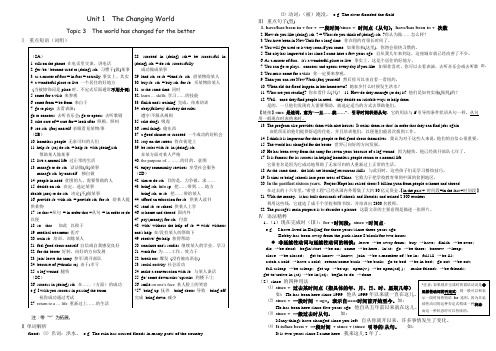
Unit 1 The Changing WorldTopic 3 The world has changed for the better Ⅰ. 重点短语(词组)注:带“*”为拓展。
Ⅱ.单词解析flood:⑴名词:洪水。
e.g. The rain has caused floods in many parts of the country.⑵动词:(被)淹没。
e.g. The river flooded the field. Ⅲ. 重点句子(型)1. have/has been in + for + 一段时间/since + 时间点(从句);have/has been to + 次数2. How do you like (doing) sth. ? = What do you think of (doing) sth. ?你认为做……怎么样?3. Y ou have been in New Y ork for a long time. 你在纽约有很长时间了。
4. Y ou will get used to it very soon if you come. 如果你来(这里),你将会很快习惯的。
5. The city has improved a lot since I came here a few years ago. 自从我几年来到这,这座城市就已经改善了不少。
6. As a matter of fact,it's a wonderful place to live. 事实上,这是个居住的好地方。
7. Y ou can go to plays,concerts and operas every day if you like. 如果你喜欢,你可以去看表演,去听音乐会或去听歌8. Y ou must come for a visit. 你一定要来参观。
9. Then you can see New Work (for) yourself. 然后你可以亲自看一看纽约。
九年级英语上册Unit1TheChangingWorld词汇精讲练习新版仁爱版
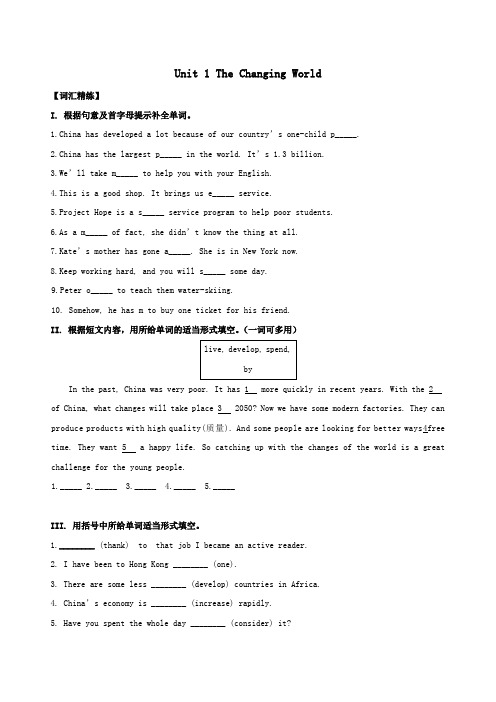
Unit 1 The Changing World【词汇精练】I. 根据句意及首字母提示补全单词。
1.China has developed a lot because of our country’s one-child p_____.2.China has the largest p_____ in the world. It’s 1.3 billion.3.We’ll take m_____ to help you with your English.4.This is a good shop. It brings us e_____ service.5.Project Hope is a s_____ service program to help poor students.6.As a m_____ of fact, she didn’t know the thing at all.7.Kate’s mother has gone a_____. She is in New York now.8.Keep working hard, and you will s_____ some day.9.Peter o_____ to teach them water-skiing.10. Somehow, he has m to buy one ticket for his friend.II. 根据短文内容,用所给单词的适当形式填空。
(一词可多用)In the past, China was very poor. It has 1 more quickly in recent years. With the 2 of China, what changes will take place 3 2050? Now we have some modern factories. They can produce products with high quality(质量). And some people are looking for better ways4free time. They want 5 a happy life. So catching up with the changes of the world is a great challenge for the young people.1._____2._____3._____4._____5._____III. 用括号中所给单词适当形式填空。
(暑期一日一练)2020九年级英语上册 Unit 1 The Changing World词汇精讲精练仁爱版
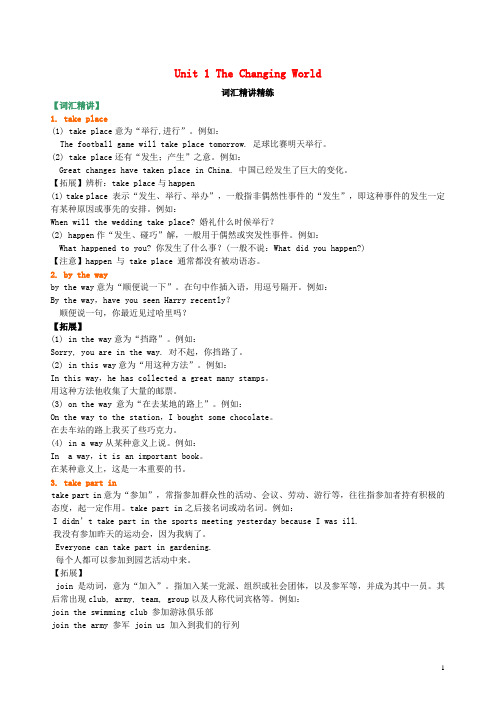
Unit 1 The Changing World词汇精讲精练【词汇精讲】1. take place(1) take place意为“举行,进行”。
例如:The football game will take place tomorrow. 足球比赛明天举行。
(2) take place还有“发生;产生”之意。
例如:Great changes have taken place in China. 中国已经发生了巨大的变化。
【拓展】辨析:take place与happen(1) take place 表示“发生、举行、举办”,一般指非偶然性事件的“发生”,即这种事件的发生一定有某种原因或事先的安排。
例如:When will the wedding take place? 婚礼什么时候举行?(2) happen作“发生、碰巧”解,一般用于偶然或突发性事件。
例如:What happened to you? 你发生了什么事?(一般不说:What did you happen?)【注意】happen 与 take place 通常都没有被动语态。
2. by the wayby the way意为“顺便说一下”。
在句中作插入语,用逗号隔开。
例如:By the way,have you seen Harry recently?顺便说一句,你最近见过哈里吗?【拓展】(1) in the way意为“挡路”。
例如:Sorry, you are in the way. 对不起,你挡路了。
(2) in this way意为“用这种方法”。
例如:In this way,he has collected a great many stamps。
用这种方法他收集了大量的邮票。
(3) on the way 意为“在去某地的路上”。
例如:On the way to the station,I bought some chocolate。
Unit1TheChangingWorld考点精析课件仁爱版九年级英语上册

A. to
B. for
C. of
D. at
2. It’s brave ____ you to face the master.
A. for
B. to
C. of
D. in
为什么不做某事
why not do(V原) sth. why don’t you do(V原) sth.
Why not ________ swimming. --- Good idea!
arrive / get to / come / reach→be in
2. 两种时态常用的时间状语不同: (1)现在完成时常用的时间状语:for, since, ever, never, yet, already, before, recently, so far … (2)一般过去时的时间状语:yesterday, last week / year / month, one year ago, in 2001, just now …
two thousand/million/hundred 两千/百万/百(具体数字后面不加s)
( )1. Five ____ dollars is a lot of money.
A. million
B. millions C. the million
D. the millions
( )2. The beautiful hotel is about ____ years old.
一、用since或for填空,完成句子 1. I have studied in this school _____f_o_r_______ six years. 2. The concert has been on _______s_i_n_c_e___ two minutes ago. 3. My grandparents have lived in the countryside ___f_o_r_________ almost twenty years. 4. My elder brother has been ill ______fo_r_______ two weeks.
(共70页)仁爱版九年级英语上册〖全册〗课时练习汇总(可做课后作业)
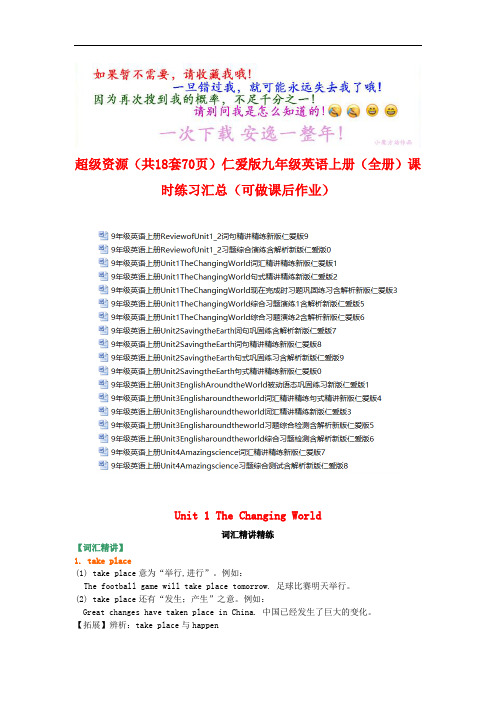
超级资源(共18套70页)仁爱版九年级英语上册(全册)课时练习汇总(可做课后作业)Unit 1 The Changing World词汇精讲精练【词汇精讲】1. take place(1) take place意为“举行,进行”。
例如:The football game will take place tomorrow. 足球比赛明天举行。
(2) take place还有“发生;产生”之意。
例如:Great changes have taken place in China. 中国已经发生了巨大的变化。
【拓展】辨析:take place与happen(1) take place 表示“发生、举行、举办”, 一般指非偶然性事件的“发生”, 即这种事件的发生一定有某种原因或事先的安排。
例如:When will the wedding take place? 婚礼什么时候举行?(2) happen作“发生、碰巧”解, 一般用于偶然或突发性事件。
例如:What happened to you? 你发生了什么事?(一般不说:What did you happen?)【注意】happen 与 take place 通常都没有被动语态。
2. by the wayby the way意为“顺便说一下”。
在句中作插入语, 用逗号隔开。
例如:By the way, have you seen Harry recently?顺便说一句, 你最近见过哈里吗?【拓展】(1) in the way意为“挡路”。
例如:Sorry, you are in the way. 对不起, 你挡路了。
(2) in this way意为“用这种方法”。
例如:In this way, he has collected a great many stamps。
用这种方法他收集了大量的邮票。
(3) on the way 意为“在去某地的路上”。
Unit 1 The Changing World Topic 3单词讲练课件 仁爱版九年级英语上册

9. whatever=__n_o__m_a_t_te_r_w__h_a_t___ 无论什么 however 无论怎样 whoever 无论谁
wherever 无论哪里 whenever 无论何时 __W__h_a_te_v_e_r________ the cause of homeless is, the effects are the same.
enjoy wonderful music and dance on Broadway.
5. visit v. 参观 ---_v_i_si_t_o_r _______ n. 游客,来访者,参观者
6. industry v. 行业,工业 Broadway stands for the American theater industry. heavy industry / light industry
3m. _ak_e__c_o_n_tr_i_b_u_ti_o_n_s_to__d_o_i_n_g_/_s_th为. ...做出贡献 Project Hope has made important contributions to both the
education and the health of children. He made great contributions to _w_i_n_n_i_n_g_____(win) the
10. _e_ff_e_c_t_____ n. 影响---___a_ff_e_c_t _________ v. 影响
Cause and effect is one way to explain things that happen
around us. Many things around us may _a_f_f_ec_t_________ our feelings.
仁爱初中英语九年级上册Unit 1 the changing world词组句子基础知识归纳背诵版
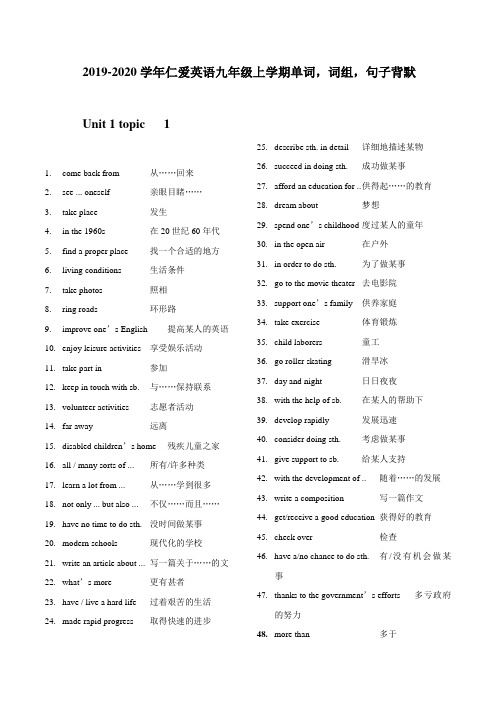
2019-2020学年仁爱英语九年级上学期单词,词组,句子背默Unit 1 topic 1e back from 从……回来2.see ... oneself 亲眼目睹……3.take place 发生4.in the 1960s 在20世纪60年代5.find a proper place 找一个合适的地方6.living conditions 生活条件7.take photos 照相8.ring roads 环形路9.improve one’s English 提高某人的英语10.enjoy leisure activities 享受娱乐活动11.take part in 参加12.keep in touch with sb. 与……保持联系13.volunteer activities 志愿者活动14.far away 远离15.disabled children’s home 残疾儿童之家16.all / many sorts of ... 所有/许多种类17.learn a lot from ... 从……学到很多18.not only ... but also ... 不仅……而且……19.have no time to do sth. 没时间做某事20.modern schools 现代化的学校21.write an article about ... 写一篇关于……的文22.what’s more 更有甚者23.have / live a hard life 过着艰苦的生活24.made rapid progress 取得快速的进步25.describe sth. in detail 详细地描述某物26.succeed in doing sth. 成功做某事27.afford an education for .. 供得起……的教育28.dream about 梦想29.spend one’s childhood 度过某人的童年30.in the open air 在户外31.in order to do sth. 为了做某事32.go to the movie theater 去电影院33.support one’s family 供养家庭34.take exercise 体育锻炼35.child laborers 童工36.go roller skating 滑旱冰37.day and night 日日夜夜38.with the help of sb. 在某人的帮助下39.develop rapidly 发展迅速40.consider doing sth. 考虑做某事41.give support to sb. 给某人支持42.with the development of .. 随着……的发展43.write a composition 写一篇作文44.get/receive a good education 获得好的教育45.check over 检查46.have a/no chance to do sth. 有/没有机会做某事47.thanks to the government’s efforts 多亏政府的努力48.more than 多于三、1. Great change s have taken place there and my hometown has become more and more beautiful.那儿变化很大,而且我的家乡变得越来越美丽了。
【中小学资料】九年级英语上册 Unit 1 The Changing World句式精讲精练 (新版)仁爱版

Unit 1 The Changing World句式精讲精练【句式精讲】1.What about you?What about…?=How about …?意为“……怎么样?”,是一个用来提建议或者征求别人意见的句式,有时也可以用来询问某人的身体状况或者近况。
其中的about是介词,因此后面要跟名词,代词或者动名词来做宾语。
例如:How (What) about the fruit? 那水果呢?How (What) about going swimming? 去游泳怎么样?How (What) about your holiday? 你的假期怎么样?How (What) about your mother? 你妈妈怎么样?2. I have been to Mount Huang with my parents.(1) been是be动词的过去分词形式。
(2) have been to是现在完成时形式,一般与already, ever, never连用。
例如:He has never been to Paris.他从未去过巴黎。
【拓展】have been to; have been in 与have gone to的辨析:(1)“have/ has been to + 地点”表示“去过某地”,现在已经回来了。
例如:I’ve been to Beijing twice. 我已去过北京两次。
(2)“have/has been in + 地点”表示“在某地待了一段时间”。
例如:He’s been in this school for two years.他在这所学校待了两年了。
(3)“have/has gone to + 地点”表示“到某地去了”,现在还没有回来,可能在去的途中,也可能在那里或返回的途中。
例如:—Where’s Wei Hua? 魏华在哪里?— She has gone to the zoo. 她到动物园去了。
仁爱版初中英语九年级上册unit 1 the changing world知识点归纳
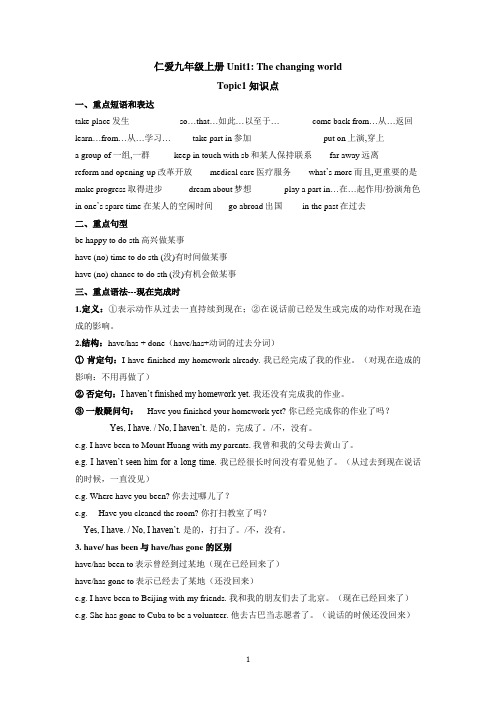
仁爱九年级上册Unit1: The changing worldTopic1 知识点一、重点短语和表达take place发生 so…that…如此…以至于… come back from…从…返回learn…from…从…学习… take part in参加 put on上演,穿上a group of一组,一群 keep in touch with sb和某人保持联系 far away远离reform and opening-up改革开放 medical care医疗服务 what’s more而且,更重要的是make progress取得进步 dream about梦想 play a part in…在…起作用/扮演角色in one’s spare time在某人的空闲时间 go abroad出国 in the past在过去二、重点句型be happy to do sth高兴做某事have (no) time to do sth (没)有时间做某事have (no) chance to do sth (没)有机会做某事三、重点语法---现在完成时1.定义:①表示动作从过去一直持续到现在;②在说话前已经发生或完成的动作对现在造成的影响。
2.结构:have/has + done(have/has+动词的过去分词)①肯定句:I have finished my homework already. 我已经完成了我的作业。
(对现在造成的影响:不用再做了)②否定句:I haven’t finished my homework yet. 我还没有完成我的作业。
③一般疑问句:---Have you finished your homework yet? 你已经完成你的作业了吗?---Yes, I have. / No, I haven’t. 是的,完成了。
/不,没有。
e.g. I have been to Mount Huang with my parents. 我曾和我的父母去黄山了。
九年级英语上册 Unit 1 The Changing World词汇精讲精练仁爱版
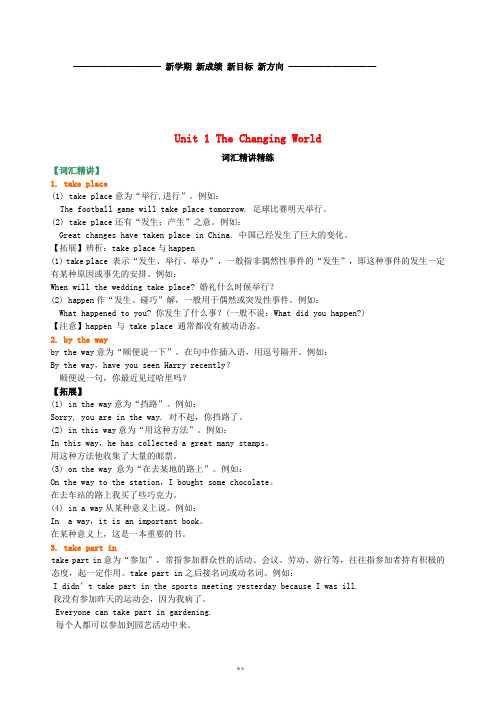
——————————新学期新成绩新目标新方向——————————Unit 1 The Changing World词汇精讲精练【词汇精讲】1. take place(1) take place意为“举行,进行”。
例如:The football game will take place tomorrow. 足球比赛明天举行。
(2) take place还有“发生;产生”之意。
例如:Great changes have taken place in China. 中国已经发生了巨大的变化。
【拓展】辨析:take place与happen(1) take place 表示“发生、举行、举办”,一般指非偶然性事件的“发生”,即这种事件的发生一定有某种原因或事先的安排。
例如:When will the wedding take place? 婚礼什么时候举行?(2) happen作“发生、碰巧”解,一般用于偶然或突发性事件。
例如:What happened to you? 你发生了什么事?(一般不说:What did you happen?)【注意】happen 与 take place 通常都没有被动语态。
2. by the wayby the way意为“顺便说一下”。
在句中作插入语,用逗号隔开。
例如:By the way,have you seen Harry recently?顺便说一句,你最近见过哈里吗?【拓展】(1) in the way意为“挡路”。
例如:Sorry, you are in the way. 对不起,你挡路了。
(2) in this way意为“用这种方法”。
例如:In this way,he has collected a great many stamps。
用这种方法他收集了大量的邮票。
(3) on the way 意为“在去某地的路上”。
例如:On the way to the station,I bought some chocolate。
九年级英语上册Unit1TheChangingWorldTopic3知识点汇编仁爱版
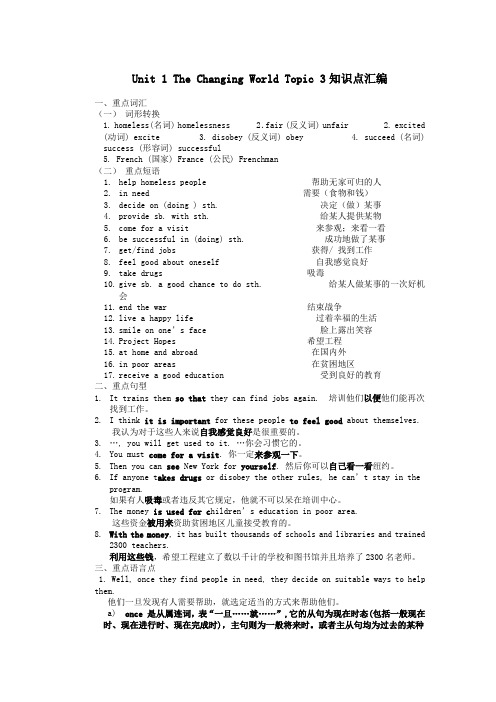
Unit 1 The Changing World Topic 3知识点汇编一、重点词汇(一)词形转换1. homeless(名词) homelessness 2.fair (反义词) unfair2. excited (动词) excite3. disobey (反义词) obey4. succeed (名词) success (形容词) successful5. French (国家) France (公民) Frenchman(二)重点短语1.help homeless people 帮助无家可归的人2.in need 需要(食物和钱)3.decide on (doing ) sth. 决定(做)某事4.provide sb. with sth. 给某人提供某物e for a visit 来参观;来看一看6.be successful in (doing) sth. 成功地做了某事7.get/find jobs 获得/ 找到工作8.feel good about oneself 自我感觉良好9.take drugs 吸毒10.give sb. a good chance to do sth. 给某人做某事的一次好机会11.end the war 结束战争12.live a happy life 过着幸福的生活13.smile on one’s face 脸上露出笑容14.Project Hopes 希望工程15.at home and abroad 在国内外16.in poor areas 在贫困地区17.receive a good education 受到良好的教育二、重点句型1.It trains them so that they can find jobs again. 培训他们以便他们能再次找到工作。
2.I think it is important for these people to feel good about themselves.我认为对于这些人来说自我感觉良好是很重要的。
精选2019届仁爱版九年级英语上Unit1_The_Changing_World词汇精讲精练

Unit 1 The Changing World词汇精讲精练【词汇精讲】1. take place(1) take place意为“举行,进行”。
例如:The football game will take place tomorrow. 足球比赛明天举行。
(2) take place还有“发生;产生”之意。
例如:Great changes have taken place in China. 中国已经发生了巨大的变化。
【拓展】辨析:take place与happen(1) take place 表示“发生、举行、举办”,一般指非偶然性事件的“发生”,即这种事件的发生一定有某种原因或事先的安排。
例如:When will the wedding take place? 婚礼什么时候举行?(2) happen作“发生、碰巧”解,一般用于偶然或突发性事件。
例如:What happened to you? 你发生了什么事?(一般不说:What did you happen?)【注意】happen 与 take place 通常都没有被动语态。
2. by the wayby the way意为“顺便说一下”。
在句中作插入语,用逗号隔开。
例如:By the way,have you seen Harry recently?顺便说一句,你最近见过哈里吗?【拓展】(1) in the way意为“挡路”。
例如:Sorry, you are in the way. 对不起,你挡路了。
(2) in this way意为“用这种方法”。
例如:In this way,he has collected a great many stamps。
用这种方法他收集了大量的邮票。
(3) on the way 意为“在去某地的路上”。
例如:On the way to the station,I bought some chocolate。
仁爱版九年级英语上全册知识点精讲
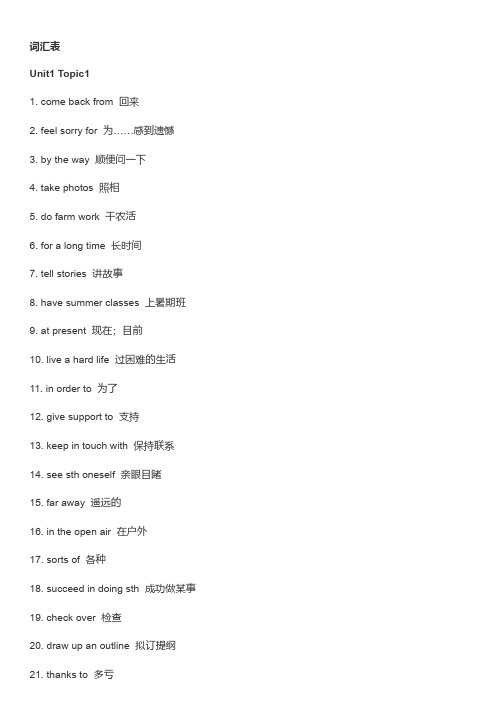
词汇表Unit1 Topic11. come back from 回来2. feel sorry for 为……感到遗憾3. by the way 顺便问一下4. take photos 照相5. do farm work 干农活6. for a long time 长时间7. tell stories 讲故事8. have summer classes 上暑期班9. at present 现在;目前10. live a hard life 过困难的生活11. in order to 为了12. give support to 支持13. keep in touch with 保持联系14. see sth oneself 亲眼目睹15. far away 遥远的16. in the open air 在户外17. sorts of 各种18. succeed in doing sth 成功做某事19. check over 检查20. draw up an outline 拟订提纲22. make progress 取得进展23. take part in 参加24. in detail 详细地25. in the past 在过去26. have no chance 没机会27. after class 课后28. day and night 日日夜夜29. more than 超过30. learn … from 向……学习31. in the future 在将来32. dream about 梦想Unit1 Topic21. get lost 迷路2. each other 互相3. call sb up 打电话给某人4. go shopping 购物5. at least 至少6. take place 发生7. because of 因为;由于8. be strict with sb 对某人要求严格9. increase by 增加了10. carry out 执行12. so far 到目前为止13. take measures to 采取措施14. a couple of 一些;几个15. keep up with 赶上16. have fun 获得乐趣;玩得开心17. offer a good education 提供一个良好的教育18. work well in 在……有成效19. be known as 将……称为;把……叫做20. the only child 独生子21. write down 写下22. less than 少于Unit1 Topic31. get used to 习惯于2. as a matter of fact 事实上3. break out 爆发4. in need 在困难时5. decide on sth 就某事做出决定6. feel good about oneself 自我感觉良好7. provide sb with sth 向某人提供某物8. live a normal life 过正常的生活9. according to 根据10. be away from 远离12. so that 为了;以便13. at the same time 同时14. take drugs 服毒15. obey the rules 遵守规则16. aim to do sth 目的是……17. at home and abroad 国内外18. in the past few years 在过去的几年中19. pay for 付款20. belong to 属于Unit2 Topic11. at present 目前2. have a picnic 野餐3. of course 当做4. be harmful to 对……是有害的5. in a bad mood 处于坏情绪6. manage to do sth 设法做某事7. at midnight 在午夜8. do harm to 有害于9. go deaf 变聋10. quite a few 相当多11. no better than 与……一样(差、坏)12. in public 在公共场合14. all sorts of 各种各样的15. in many ways 在许多方面16. for example 举个例子17. have an effect on sth 对某事有影响18. two days later 两天后19. in the past 在过去20. at the end of 在……的末尾Unit2 Topic21. as a result 结果2. here and there 到处3. walk on grass 践踏草坪4. care for 关心;照顾5. pick flowers 摘花6. give some advice to 给……一些建议7. in the beginning 在开端8. cut down 砍伐9. prevent sb from doing sth 阻止某人做某事10. in danger of 处于……的危险中11. come to do sth 开始做某事12. day by day 一天天13. follow the rules 遵守规则14. come into being 形成16. change into 变成……17. take away 带走18. pass through 通过;穿过19. be helpful to 对……是有帮助的;有助于……20. refer to 指的是……21. deal with 处理22. at the same time 同时23. take up 占据24. stop sb from doing sth 阻止某人做某事25. wash away 冲走Unit2 Topic31. interview sb about sth 采访某人某事2. spread the message 传递信息3. encourage sb to do sth 鼓励某人做某事4. protect the environment 保护环境5. save money 省钱6. be supposed to 理应;应该7. ought to 应该8. travel a short distance 短途旅行9. make sure 确保10. on time 准时11. make an announcement 发个口头通知13. work hard 努力工作(学习)14. hurry up 快点;赶快15. instead of 代替16. of course 当然17. fail the exam 考试失败18. take part in 参加19. be used for 被用作……20. turn green 变绿;变得环保Unit3 Topic11. stick on 粘在……上2. be able to 有能力;能够3. be ready for 为……准备好4. can’t wait to 迫不及待要……5. from now on 从今以后6. one day 有一天;某一天7. throughout the world 全世界8. on business 出差9. be similar to 与……相近10. be pleased with 对……感到满意11. translate into 翻译成……12. once in a while 偶尔;有时13. in general 通常;大体上15. as a result 结果16. be regarded as 被当做……17. take the leading position 占据领先地位18. be required to 被要求……19. the rest of 剩余的20. make progress in 在……取得进展21. take a swimming course 上游泳课程22. be popular with 在……中受欢迎23. change with 随……而变化24. as well as 也25. have trouble doing sth 做某事有麻烦Unit3 Topic21. instead of 代替2. say hello to 向……问好3. by the way 顺便说4. see sb off 给……送行5. depend on 依靠6. be worried about 担心……7. leave for 动身往…8. put out 伸出;熄灭9. on one’s way to 在某人去……的路上10. make oneself understood 使(自己)被听懂12. as for 至于13. in a word 一句话;总之14. take in 吸收15. in the beginning 在开头;初期16. little by little 一点点地17. come about 发生;产生18. be forced to do sth 被迫去做某事19. in person 亲自20. be fond of 喜欢Unit3 Topic31. get into trouble 陷入麻烦;惹麻烦2. agree with 同意3. give up 放弃4. work hard at 努力于5. be afraid of 害怕6. keep a diary 写日记7. be weak in 在……弱8. give some advice sth 就某事给些建议9. have a try 尝试一下10. take a breath 吸口气11. share sth with sb 与某人分享某物12. as often as possible 尽可能经常地14. make mistakes 犯错15. make great progress 取得巨大进步16. insist on sth 坚持某事17. feel like doing sth 想要做某事18. laugh at 嘲笑19. last but not least 最后但同样重要的20. in public 在公共场合Unit4 Topic11. dream of 梦想2. point to 指向……3. send up 发射4. no doubt 毫无疑问5. for instance 举个例子6. click on 点击7. connect to 与…….连接8. in the future 在未来9. in space 在太空10. at the same time 同时11. come into being 形成12. thanks to 多亏;由于13. chat on line 在线聊天14. a list of 一列的;一份……清单16. of course 当然17. study hard 努力学习18. with the help of 在……的帮助下19. do business 做生意20. land on 登陆Unit4 Topic21. for certain 确定2. make a contribution to 为……做贡献3. as long as 只要4. in short 总之5. run away 跑开6. be allowed to do sth 被允许7. be made of 由……制成8. come true 成为现实;实现9. be made from 由……制成10. be used for 被用作11. take photos 照相12. during one’s life 在某人一生中13. so far 到目前为止14. be similar to 与……相近15. all the time 一直16. no longer 不再17. have effects on 对……产生影响18. the rest of 剩余的19. to one’s surprise 令人惊讶的是20. be meant to do sth 应该做某事Unit4 Topic31. base on 基于2. hand in 上交3. be full of 充满……4. in order to 为了5. know about 知道;了解6. a group of 一群7. go wrong 走错路8. on the earth 在地球上9. in the future 在未来10. be able to 有能力11. come true 实现12. grow up 长大13. search for 搜索……14. be on show 展览15. make up one’s mind 下定决心16. side by side 肩并肩地17. look forward to 盼望18. be close to 靠近19. each other 互相20. do experiments 做实验各单元重要知识点汇总Unit1 The Changing WorldTopic1 Our country has developed rapidly.【重点短语和句型】1. have a good summer holiday 暑假过得愉快2. come back from 从......回来3. have/has been to 去过4. have/has gone to 去了5. not...any more 再也不...6. take photos 照相7. by the way 顺便问一下8. take part in 参加9. around/all over/throughout the world 全世界10. tell sb. something about... 告诉某人关于某事11. have/live a happy/hard life 过着幸福/艰苦的生活12. describe...in detail 详细描述13. give support to 支持...14. see...oneself 亲眼看见15. keep in touch with 与...保持联系16. far away 遥远的17. kinds/sorts of 各种各样的...18. not only...but also 不仅...而且...19. make progress 取得进步20. more than/over 多于21. develop/improve rapidly 迅速发展/改善22. tell sb. (not ) to do sth. 告诉某人(别)做某事23. ask sb. (not ) to do sth. 要求某人(别)做某事24. in order to do sth. 为了做某事25. have to do sth. 不得不做某事26. It\\'s +形容词+for sb. to do sth. 对于某人来说做某事是...的27. why not do sth. 为什么不做某事28. succeed/be successful in doing sth. 成功地做某事29. dream about doing sth. 梦想做某事30. see/hear sb. do/doing sth. 看见/听见某人做/正在做某事【重点语法】现在完成时一. 现在完成时的基本结构肯定句:主语+have/has+动词的过去分词+其他否定句:主语+have/has+not+动词的过去分词+其他一般疑问句:Have/Has+主语+动词的过去分词+其他特殊疑问句:特殊疑问词+一般疑问句(have/has+主语+过去分词+其他)二. 现在完成时的用法1. 现在完成时用来表示过去已经完成的动作对现在造成影响或后果。
九年级英语上册Unit1TheChangingWorldTopic2知识点汇编仁爱版
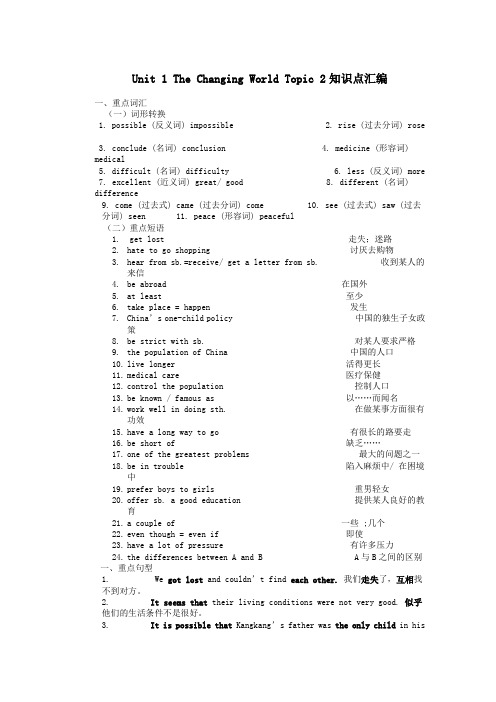
Unit 1 The Changing World Topic 2知识点汇编一、重点词汇(一)词形转换1. possible (反义词) impossible2. rise (过去分词) rose3. conclude (名词) conclusion4. medicine (形容词) medical5. difficult (名词) difficulty6. less (反义词) more7. excellent (近义词) great/ good8. different (名词) difference9. come (过去式) came (过去分词) come 10. see (过去式) saw (过去分词) seen 11. peace (形容词) peaceful(二)重点短语1. get lost 走失;迷路2.hate to go shopping 讨厌去购物3.hear from sb.=receive/ get a letter from sb. 收到某人的来信4.be abroad 在国外5.at least 至少6.take place = happen 发生7.China’s one-child policy 中国的独生子女政策8.be strict with sb. 对某人要求严格9.the population of China 中国的人口10.live longer 活得更长11.medical care 医疗保健12.control the population 控制人口13.be known / famous as 以……而闻名14.work well in doing sth. 在做某事方面很有功效15.have a long way to go 有很长的路要走16.be short of 缺乏……17.one of the greatest problems 最大的问题之一18.be in trouble 陷入麻烦中/ 在困境中19.prefer boys to girls 重男轻女20.offer sb. a good education 提供某人良好的教育21.a couple of 一些 ;几个22.even though = even if 即使23.have a lot of pressure 有许多压力24.the differences between A and B A与B之间的区别一、重点句型1. We got lost and couldn’t find each other.我们走失了,互相找不到对方。
九年级英语上册Unit1TheChangingWorld知识点(新版)仁爱版

九年级英语上册:Unit 1 Topic1 1 Our country has developed rapidly.一·词组。
take place 发生,进行①keep in touch with…跟…保持联系②get in touch with…与…取得联系reform and opening-up 改革开放make progress 取得进展succeed in doing sth. 成功地做某事take photos 照相learn…from…向... 学习……put on 举办,上演,展出more than 超过,多于see sth. oneself 亲眼目睹某物have the chance to do sth. 有机会做某事far away 遥远的play a/an…part起……作用,有……影响in one's spare time 在某人空闲时间be happy/glad/pleased to do sth. 高兴做某事have a good summer holiday 过一个快乐的暑假a group of old people 一群老人be crowded into sp. 挤在一个地方receive a good education 接受好的教育not only … but also 不仅…而且satisfy people's needs 满足人们的需求enjoy good medical care 享受好的医疗照顾①remember the past 记住过去②live in the present 立足现在③dream about the future 展望未来make a tour abroad 出国旅游used to do sth. 过去常做某事be/get used to doing sth. 习惯做某事have no time to do sth. 没有时间做某事in the 1960s 在二十世纪六十年代in a short time 在短时间内二.句子1.Where have you been? 你已经去过哪了?I have been to Mount Huang with my parents. 我和我的父母去了黄山。
九年级英语上册Unit1TheChangingWorld句式精讲精练新版仁爱版

Unit 1 The Changing World句式精讲精练【句式精讲】1.What about you?What about…?=How about …?意为“……怎么样?”,是一个用来提建议或者征求别人意见的句式,有时也可以用来询问某人的身体状况或者近况。
其中的about是介词,因此后面要跟名词,代词或者动名词来做宾语。
例如:How (What) about the fruit? 那水果呢?How (What) about going swimming? 去游泳怎么样?How (What) about your holiday? 你的假期怎么样?How (What) about your mother? 你妈妈怎么样?2. I have been to Mount Huang with my parents.(1) been是be动词的过去分词形式。
(2) have been to是现在完成时形式,一般与already, ever, never连用。
例如:He has never been to Paris.他从未去过巴黎。
【拓展】have been to; have been in 与have gone to的辨析:(1)“have/ has been to + 地点”表示“去过某地”,现在已经回来了。
例如:I’ve been to Beijing twice. 我已去过北京两次。
(2)“have/has been in + 地点”表示“在某地待了一段时间”。
例如:He’s been in this school for two years.他在这所学校待了两年了。
(3)“have/has gone to + 地点”表示“到某地去了”,现在还没有回来,可能在去的途中,也可能在那里或返回的途中。
例如:—Where’s Wei Hua? 魏华在哪里?— She has gone to the zoo. 她到动物园去了。
- 1、下载文档前请自行甄别文档内容的完整性,平台不提供额外的编辑、内容补充、找答案等附加服务。
- 2、"仅部分预览"的文档,不可在线预览部分如存在完整性等问题,可反馈申请退款(可完整预览的文档不适用该条件!)。
- 3、如文档侵犯您的权益,请联系客服反馈,我们会尽快为您处理(人工客服工作时间:9:00-18:30)。
Unit 1 The Changing World词汇精讲精练词汇精讲1. take place(1) take place意为“举行,进行”。
例如:The football game will take place tomorrow. 足球比赛明天举行。
(2) take place还有“发生;产生”之意。
例如:Great changes have taken place in China. 中国已经发生了巨大的变化。
拓展辨析:take place与happen(1) take place 表示“发生、举行、举办”,一般指非偶然性事件的“发生”,即这种事件的发生一定有某种原因或事先的安排。
例如:When will the wedding take place? 婚礼什么时候举行?(2) happen作“发生、碰巧”解,一般用于偶然或突发性事件。
例如:What happened to you? 你发生了什么事?(一般不说:What did you happen?)注意happen 与 take place 通常都没有被动语态。
2. by the wayby the way意为“顺便说一下”。
在句中作插入语,用逗号隔开。
例如:By the way,have you seen Harry recently?顺便说一句,你最近见过哈里吗?拓展(1) in the way意为“挡路”。
例如:Sorry, you are in the way. 对不起,你挡路了。
(2) in this way意为“用这种方法”。
例如:In this way,he has collected a great many stamps。
用这种方法他收集了大量的邮票。
(3) on the way 意为“在去某地的路上”。
例如:On the way to the station,I bought some chocolate。
在去车站的路上我买了些巧克力。
(4) in a way从某种意义上说。
例如:In a way,it is an important book。
在某种意义上,这是一本重要的书。
3. take part intake part in意为“参加”,常指参加群众性的活动、会议、劳动、游行等,往往指参加者持有积极的态度,起一定作用。
take part in之后接名词或动名词。
例如:I didn’t take part in the sports meeting yesterday because I was ill.我没有参加昨天的运动会,因为我病了。
Everyone can take part in gardening.每个人都可以参加到园艺活动中来。
拓展join是动词,意为“加入”。
指加入某一党派、组织或社会团体,以及参军等,并成为其中一员。
其后常出现club, army, team, group以及人称代词宾格等。
例如:join the swimming club 参加游泳俱乐部join the army 参军 join us 加入到我们的行列4. enough(1)enough是形容词,意为“充足的,充分的,足够的”,可作表语或定语,作定语时,可放在名词的前面。
例如:The food is enough for the trip.用于这次旅行的食物足够了。
I have enough time to watch TV.我有足够的时间看电视。
(2)enough还可作副词,意为“足够的”,这时enough需放在所修饰的形容词或副词后面。
例如:The young man is strong enough to carry the heavy bag.那个年轻人足够强壮能搬动重包。
拓展(1)There be enough…“有足够的……”。
例如:There aren’t enough seats for all the people to sit down.没有足够的座位能让所有的人坐下。
(2)enough…to do sth. “有足够的……做某事”。
例如:I don’t have enough time to eat l unch.我没有足够的时间吃午饭。
(3)enough to do…可以同too…to…或so…that…结构互相转换。
例如:He isn’t old enough to go to school. = He is too young to go to school.= He is so young that he can’t go to school.他太小而不能上学。
5. fewfew为形容词,意为“不多,很少”,只能与可数名词搭配,表示“几乎没有”,自身有否定含义。
也常与不定冠词a组成词组a few,表示“有一点”,有肯定含义。
例如:He has few friends. 他几乎没朋友。
May I ask a few questions? 我可以问几个问题吗?拓展辨析:few/a few little/a little(1) few/a few只能用来修饰可数名词,few表示否定,意为“没有,几乎没有”;a few表示肯定,意为“有几个,有一些”。
例如:He has few friends here, he feels lonely.他这里没朋友,他感觉寂寞。
There are a few eggs in the basket.篮子里有几个鸡蛋。
(2) little/a little只能用来修饰不可数名词,little表示否定,意为“没有,几乎没有”;a little 表示肯定,意为“有一点,有一些”。
例如:There is little ink in my bottle,can you give me a little ink?我的瓶子里没有墨水了,你能给我点儿墨水吗?6. succeedsucceed 表示“成功”,是不及物动词; succeed 后通常接in doing sth,表示做某事做成功了。
例如:His plan succeeded.他的计划成功了。
At last he succeeded in solving the problem.他终于把那个问题解决了。
She succeeded in (passing) the exam. 她考试及格了。
拓展(1) success 表示抽象意义的“成功”,是不可数名词;表示具体意义的“成功的人或事”, 则是可数名词。
例如:Failure is the mother of success. 失败是成功之母。
His new book was a great success.他新出版的书获得了巨大成功。
(2) successful作形容词,意为“成功的”。
例如:The performance was successful. 演出很成功。
It was a successful experiment. 那是一次成功的试验。
7. everever是副词,意为“曾经,总是,在任何时候”。
其用法如下:(1) 用于肯定句中,表示“曾经,总是”,加强语气。
例如:He is ever repeating the same words.他总是重复同样的话。
(2) 用于一般疑问句、否定句或条件从句中,表示“曾经,从来,在任何时候”。
例如:Do you ever wish you were rich? 你曾经希望自己很富有吗?(3) 用在特殊疑问词之后,加强语气,含“究竟、到底”之意。
例如:Where ever do you want to go? 你究竟想去哪里?(4) 用于比较级中,置于than之后,表示“以前,以往”。
例如:It’s raining harder than ever. 雨比以前下得更大了。
拓展already ever与yet的辨析:(1) already是副词,意为“已经”,与现在完成时连用,通常用于肯定句。
例如:I have already seen the film. 我已经看过这部电影了。
(2) ever是副词,意为“曾经”。
常与现在完成时连用,还可用于疑问句、否定句、比较级和最高级之后。
例如:Have you ever been to Beijing?你曾经去过北京吗?My younger brother studied harder than ever. 我弟弟比以前学习更用功了。
(3) yet是副词,意为“已经”,与现在完成时连用,用于疑问句或否定句中,通常置于句末,也可以与not连用。
not yet常用来简略回答完成时态的一般疑问句,意为“还没有”。
例如:— Has the train started yet? 火车已经开了吗?— Not yet. 还没有。
8. populationpopulation意为“人口”时,是一个集体名词,被看作一个整体,在句中作主语时,后面的谓语动词用单数形式。
例如:China has a quarter of the world’s population. 中国人口占世界人口的四分之一。
拓展(1) 当表示一个城市、地区或国家有多少人口时,常用以下两种结构,即“the population of 某地is 数词”或“某地 has a population of 数词”。
例如:The population of London is over ten million. =London has a population of over ten million. 伦敦的人口超过一千万。
(2) population可与large,small搭配,但不能与many,few搭配。
例如:The city with its large population has bee crowded.这个人口众多的城市变得拥挤不堪了。
(3) 询问人口数量常用what或how large。
例如:What’s the population of the city? =How large is the population of the city?这个城市有多少人口?(4) population前有修饰词,如分数、百分数时,表示整体人口中的一部分,谓语动词用复数形式。
例如:One half of the population of the city are farmers. 这个城市的一半人口是农民。
9. offer(1) 作动词,意为“给予,提供(有主观上愿意供给的意思)”。
例如:He offered me a glass of wine. 他端给我一杯酒。
(2) 作动词,意为“愿意,试图(做某事);提议”;后面一般加动词不定式。
